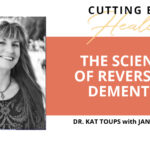
Researchers at the Gladstone Institutes in San Francisco have been able to shed light on the potential pathway through which APOE4 exacerbates neurodegenerative processes. It’s being called a revelatory finding in the Journal Nature Aging. They were also able to target this pathway in mice with two drugs and the result was strong protection AGAINST APOE4-driven neurodegeneration! The finding even surprised the team involved.
It’s time to beef up the fiber in your diet to protect your brain from gut toxins traveling on a newly discovered pathway, getting through the blood-brain barrier, causing inflammation there and contributing to dementia. This groundbreaking research was done in Louisiana and presented in the scientific journal, Frontiers in Neurology.
For me, getting the appropriate amount of fiber in my diet has to be planned. I find I can’t get it with just food alone. It takes supplementing with something like TruFiber with 3.5g of fiber per scoop. According to current data, the average daily fiber intake for Americans ranges from 10 to 15 grams. Nonetheless, the USDA advises higher recommended daily allowances, suggesting that women under the age of 50 should aim for 25 grams of fiber, while men should target 38 grams. For individuals aged 50 and above, the recommended fiber intake is 21 grams for women and 30 grams for men.
More evidence seems to demonstrate for women that starting hormone replacement therapy in one’s 40s and 50s has neuroprotective benefits.
A study published in October in Cell Reports shows a common fungus not clearing properly from the brain is triggering toxic amyloid plaques like what is seen in Alzheimer’s. This research used mouse brains. The fungi is candida albicans. Here’s a link: https://flip.it/e.0c12
You may want to pull out your latest lipid panel and see where you are with your triglycerides. Higher triglycerides have been found to lower one’s risk of dementia and may slow cognitive decline. This research was published in the October 25, 2023 online issue of Neurology.
This is a worrisome data analysis when it comes to diagnosing Mild Cognitive Impairment (MCI). In a study published last month in the Journal of Prevention of Alzheimer’s Disease, Medicare data collected from more than 200,000 primary care clinicians and 50,000 practices between 2017 to 2019 was examined closely. It found that doctors and practices failed to diagnose about 92% of expected Mild Cognitive Impairment cases on average. Click here to learn more.
Using a non-invasive electrical stimulation procedure, researchers announced last month success with triggering the hippocampus to enhance memory. In temporal interference, high-frequency electric fields are sent into the brain through electrodes attached to the outside of the scalp. It worked on young adults to improve memory. This was published in Nature Neuroscience. The next step is a clinical trial with early Alzheimer’s patients.
Are you depressed or too stressed? A large Swedish study says that’s not good when it comes to preventing dementia.
Scientific American had this article about ways to increase your healthspan to prevent age-related disease like dementia.
fiber












